#UnbossersNetwork #CorporateCulture
How to foster a unique culture within a Buy & Build growth scenario – A reflection of our ‘GenZJester’ Students

by Bo De Pauw, Jacqueline Elliott, Dylan Van Loon and Sébastien Guinée
The Unbossers Network is bringing together 11 influential leaders of corporate change, alongside their colleagues from esteemed organizations to forge connections with companies that have successfully intertwined business success with a genuine concern for both society and its people. As we embark on this unique journey, we are simultaneously capturing the compelling narratives of these exceptional events. We present to you the fourth installment of this series – a truly remarkable account crafted by our four talented ‘GenZJester’ Students.
Introducing our ‘GenZJester’ Students
In today’s fast-paced business world, the war for talent rages on. To address this pressing issue with the Unbossers Network, we turned to an unconventional source of wisdom – the ‘jesters’.
Originating in the Middle Ages, the jester was a beloved figure in the royal court, tasked with providing entertainment while also serving as the only individual who could openly criticize the monarch without fear of reprisal. They utilized humor and satire to bring attention to difficult or sensitive topics that were often swept under the rug.
In a unique twist, we enlisted the help of four students – Economics and Commercial Engineers from the University of Antwerp that follow the course ‘Organizational theory and design’ with Professor Steffi Weil – as our modern-day jesters (‘GenZJesters’). Without the knowledge of the participants, they were given the role of the jester during our roundtable.
Throughout the day, they brought a fresh perspective, offering dissent, reflection, and humor as remedies for filtered perceptions and power imbalances. They challenged old management thinking, dismantled technological limits and bureaucratic barriers, and inspired radical new ideas.
To cap off the event, the GenZJesters offered both solicited and unsolicited advice to the group. They provided unvarnished truth, held up a mirror to surface blind spots, and offered a neutral, outsider’s perspective – all with the mandate to speak freely and without fear of retribution. Their contributions added a unique and valuable dimension to the discussions, shedding new light on the war for talent and the importance of outside perspectives in shaping our organizations.
3 of our 4 Unbossers Network 2023 Jester Students - Bo, Jacqueline and Dylan
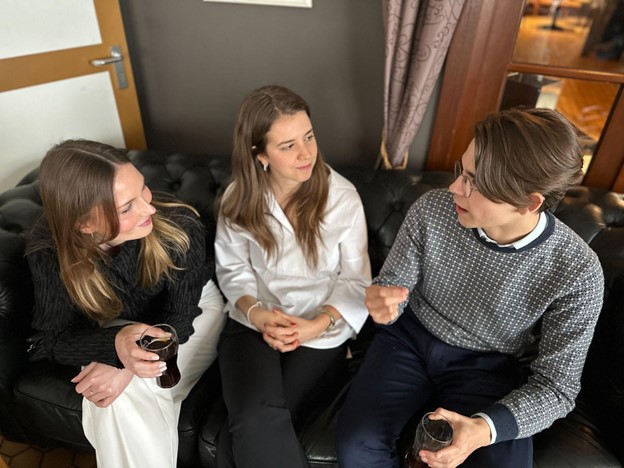
The Roundtable storyline
About Daddy Kate
At the Unbossers Network, we prefer to avoid lofty discussions and instead prioritize practical, real-world applications. To that end, we recently welcomed Projective Group – one of our esteemed members – to share their inspiring tale of growth and the obstacles they encountered along the way.
Founded in 2006 as a small consulting firm in Belgium, Projective Group specializes in serving the financial industry with its renowned “Projective approach,” which emphasizes the convergence of strategy and execution via small, highly skilled teams. Thanks to their exceptional approach and outstanding reputation, the company experienced rapid expansion over the years. With the help of private equity investments, Projective Group was able to acquire other companies and broaden their range of services. Their ultimate goal is to become a one-stop-shop for financial institutions seeking solutions to their transformational challenges.
Daddy Kate employee in the production plant
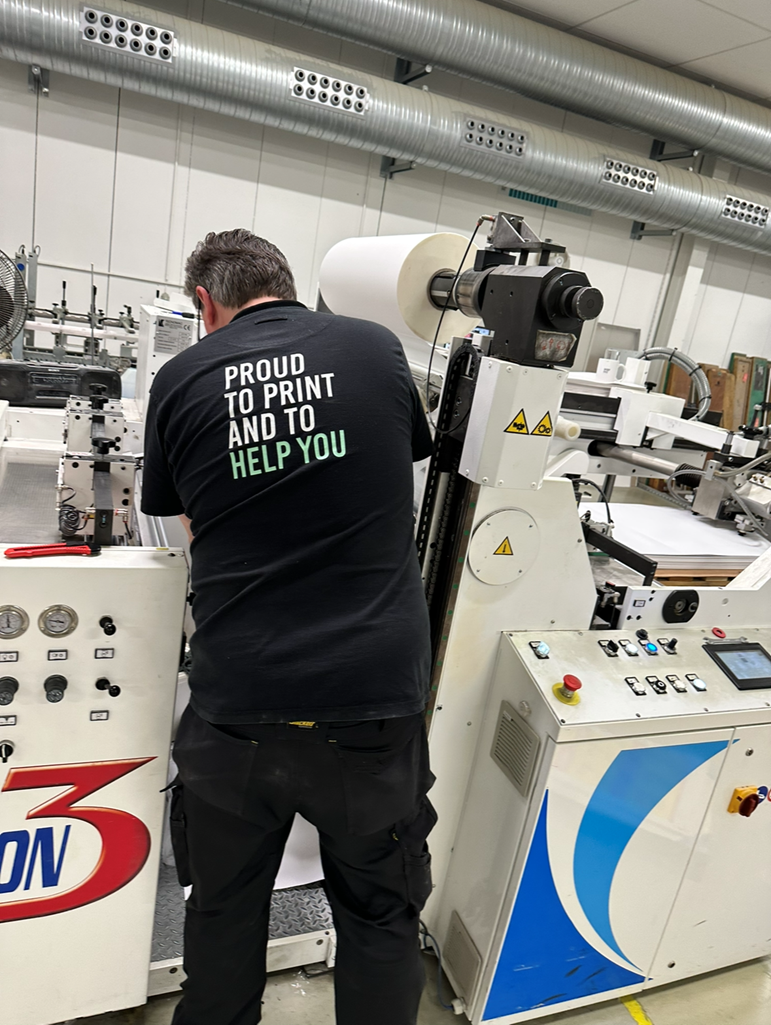
The discussion case of Projective Group
On the 28th of April, 2023, the Unbossers Network program made its way to Daddy Kate – a family-owned printing company. Here, leaders gathered to engage in meaningful conversations regarding the challenges and ideas surrounding the cultivation of a people-centric culture in a diverse and rapidly expanding business environment.
Despite the printing market contracting by over 60% in the past decade, Daddy Kate has managed to thrive by offering top-notch printing services and a willingness to accommodate any customer request. While most competitors prioritize operational efficiency and cost-cutting measures, Daddy Kate’s unwavering commitment to customer intimacy has been the driving force behind their inspiring growth journey. To achieve this level of success, the company prioritizes maximum flexibility and quality in their production processes and instills a similar mindset in their workers.
Laurent Zintz, Projective Group CFO, explaining the Projective Group story to Jester Student Sebastien Guinée and Koen Jacobs, B2B Director Belux at Nestlé Nespresso
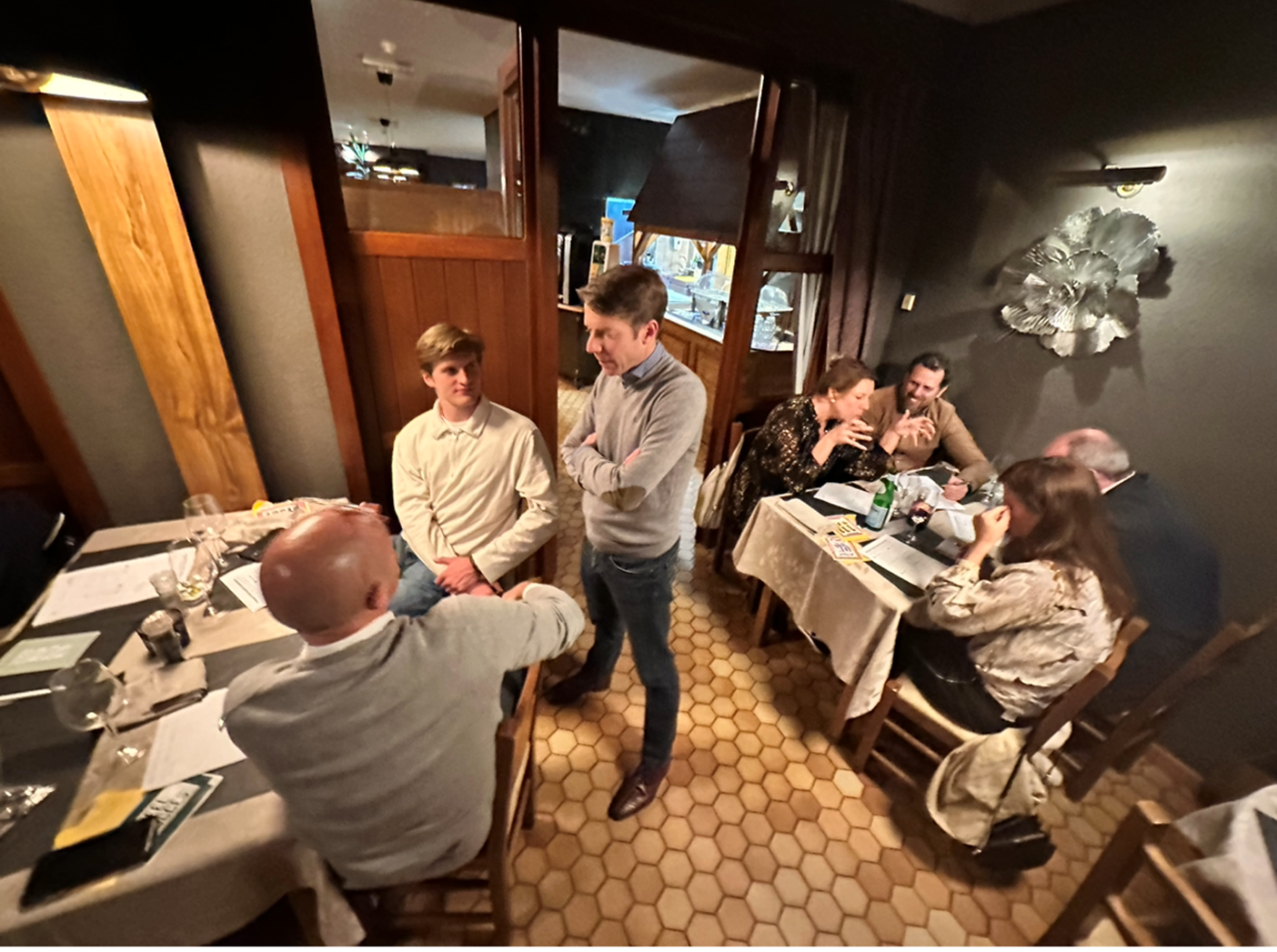
The visions and strategies of these two rapidly expanding companies sparked engaging and contemplative conversations centered around topics that are pertinent to all organizations:
- How can a profit-driven strategy that values shareholders be successfully integrated with an alluring narrative?
- How can local decision-making be encouraged without losing sight of overarching goals?
- How can a balance be struck between empowering local decision-makers while still keeping central objectives in focus?
These are crucial questions that companies must grapple with in order to flourish in an ever-evolving and competitive marketplace. Our ‘Jester’ Students have distilled their perspectives on these challenges into five key reflections:
Our GenZJesters’ reflections
Reflection #1: The importance of transparency and autonomy in building trust and cultivating a productive work environment
For us trust is built on transparency. While it’s understandable for a company to prioritize growth and profit, it’s crucial for us that they are upfront about their motivations. We believe this approach not only attracts the right talent but also fosters a sense of honesty that we value more than just hearing the right things.
It also seems to us that allowing people enough autonomy in a buy-and-built strategy is key as different cultures may arise from various mergers. It’s not always necessary to implement solutions forcefully, and sometimes it’s best to let situations play out and allow those working with you to think for themselves.
Lastly, we loved that disagreements were encouraged during the day and we believe it’s beneficial as it promotes healthy discourse and is not about conforming to a certain ideology.
Reflection #2: Shift focus – stop trying to force everyone into one culture
At first, Projective Group sought guidance from the Roundtable on how to establish a uniform culture throughout their European offices. Yet, Thijs from Daddy Kate made a compelling argument that even they encounter distinct cultures in each of their locations. This realization caused a shift in thinking towards creating a culture that fosters collaboration and success for all individuals involved, rather than striving for a singular, homogeneous culture.
We feel the discussion on establishing a ‘multi-culture’ where everyone can thrive and work together is relevant because in today’s competitive job market, talent like us, we have many options and will choose to work for companies that align with our values and provide a positive work environment.
We believe companies that prioritize creating a diverse culture where everyone can thrive and work together will be more successful in attracting and retaining top talent. For us it is not just about offering competitive salaries and benefits, but also about creating a workplace culture where employees feel valued, supported, and can grow both personally and professionally.
In the case of multiple acquisitions, each company will likely have its own distinct culture, so it is crucial to avoid excessive intervention. Giving employees the space to think for themselves can be advantageous. To effectively lead a diverse and fast-growing organization, it is important for leaders to show their employees and acquisitions what to do, rather than just telling them what to do.
“It should also be acceptable if not everyone aligns completely with the company’s vision; after all, companies are not a cult. In fact, a healthy level of dissent can be productive.”
Daddy Kate principles can’t be missed when you enter the office
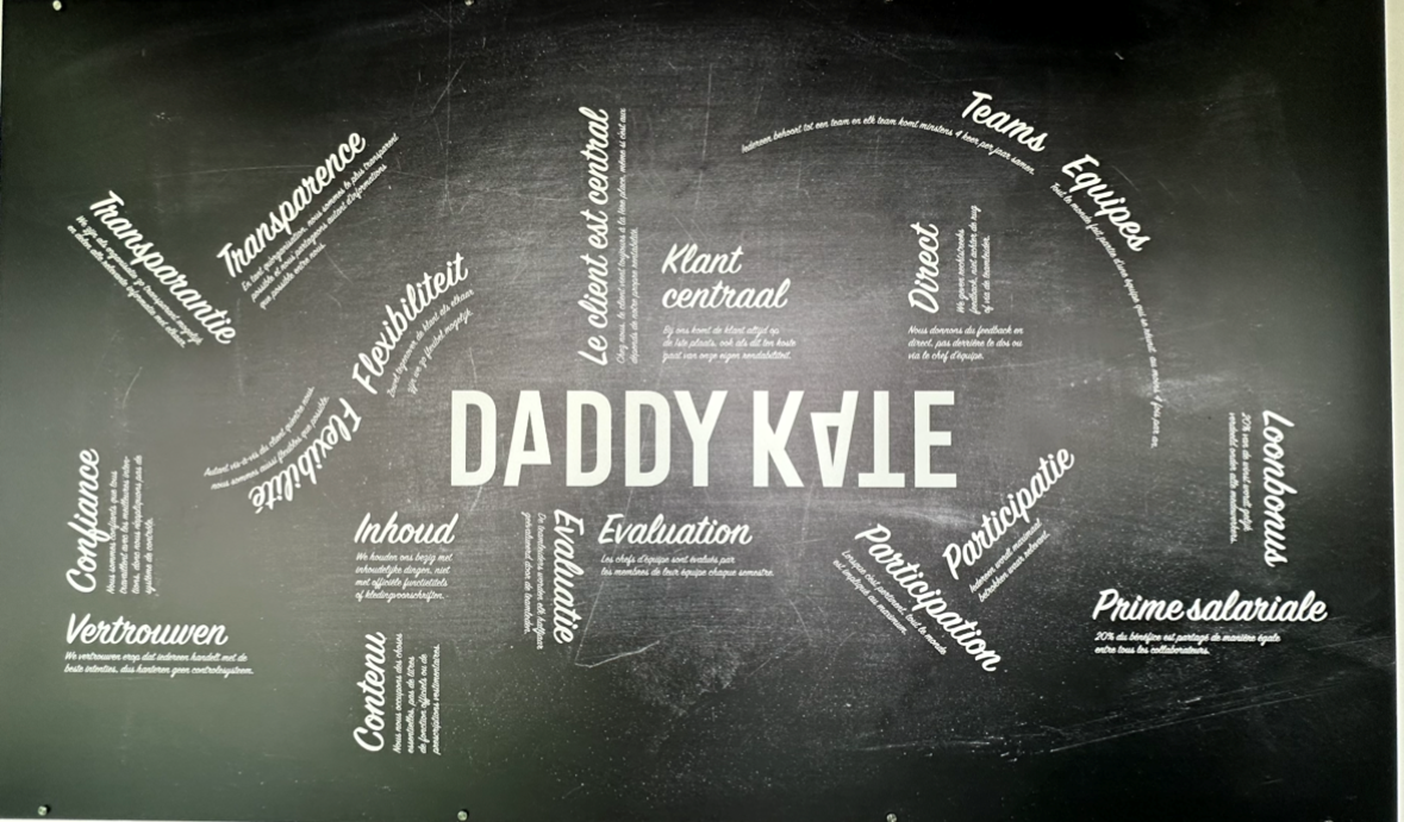
Reflection #3: The importance of highlighting and honoring current company behavior
We noticed the discussion often prioritizes the desired future state of organizations over their current state. Yet, we feel it’s crucial to evaluate how prospective clients and employees perceive the company in its current form. Because we live much more in the now than in the future.
Rather than imposing a new culture, we think it is vital to capitalize on the company’s existing strengths. Allowing the culture to evolve more naturally, rather than coercing its creation, may yield better insights into what the culture should ultimately be.
In addressing cultural challenges within a company, we feel it is crucial to first identify the values and norms that are actually practiced by employees, rather than imposing new ones that may be difficult to uphold. To achieve this, effective communication with all stakeholders is key, as exemplified by Daddy Kate’s approach.
We recommended that Projective Group focus on their growth ambitions as a foundation for their culture, which can attract like-minded individuals who are committed to building the best and largest one-stop shop for financial institutions in Europe.
By being transparent and honest about these values and goals, a company can establish a basis of trust with its employees, who want to know what they are signing up for. This level of openness can inspire greater motivation and engagement among workers.
Each team at Daddy Kate has its own information board
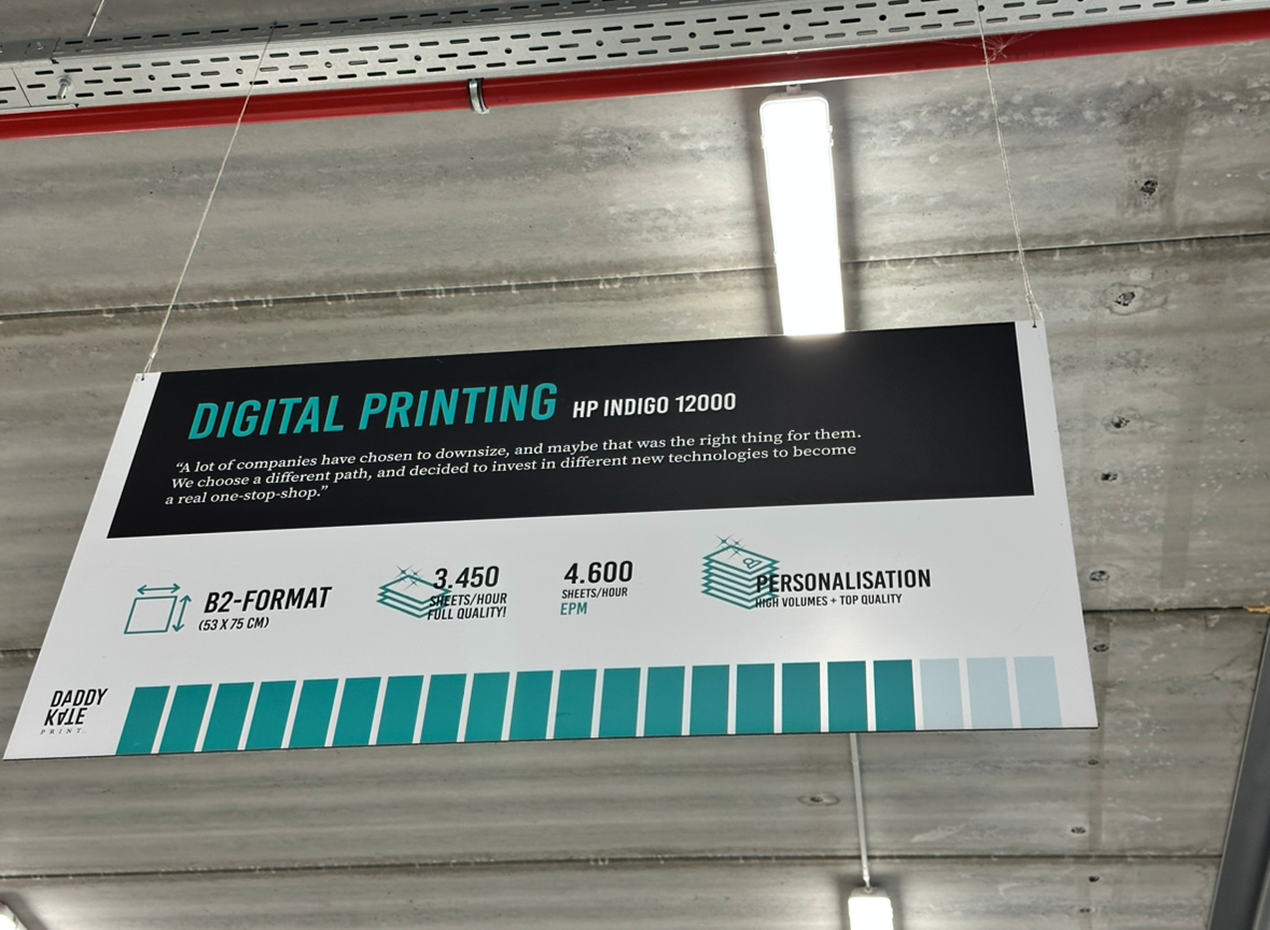
Reflection #4: Our insights from top leaders for long-term career success: Embracing mistakes, gut decisions, and the importance of likeability
During the Roundtable dinner with these business changemakers, we also gained valuable insights for our own career paths. Because in today’s fast-paced world, it’s difficult for us to understand what it truly means to have a successful career.
One important lesson was to not be afraid of making mistakes and to have a desire to constantly learn, as entering the workforce without all the answers is normal. Another key takeaway was the importance of liking the people you work with. To determine this, it is recommended we meet with at least three people from a potential employer during the interview process.
In our generation, there is a tendency to quickly move on to another job or company when faced with challenges. However, these changemakers shared that by doing so, valuable learning opportunities may be missed. While excelling in your job is important, it may not necessarily equate to making a significant impact for the company.
One leader recounted how he was praised by his boss for doing well, but realized he was not making an impact. He then decided to set aside time each day to work towards making a positive difference for the company, which he continues to do to this day.
Join
our Unbossers Network
Build a people first-organization the unbossed way:
Do you want to learn concrete steps on how to combine the pursuit of business success with putting people first? Just take a look at our Unbossers Network which offers low-key accessibility into global connections and teachings for you and your organisation.
We will be happy to welcome you there!